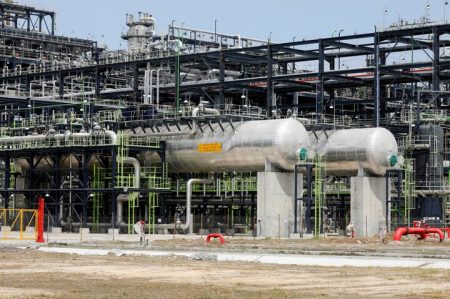
Houston — Oil fell on Thursday as geopolitical tensions eased slightly and rising numbers of COVID-19 cases in China added to worries over demand in the world’s largest crude importer.
Poland and NATO on Wednesday said a missile that crashed inside NATO member Poland was probably a stray fired by Ukraine’s air defences and not a Russian strike, easing fears of the war between Russia and Ukraine spilling across the border.
“Thankfully, those fears have abated and the situation de-escalated, which has seen oil gains unwound,” said Craig Erlam, senior market analyst at OANDA. “China remains a downside risk for oil in the near term.”
Brent crude fell $2.13 to $90.73 a barrel, a 2.3% loss, by 10:58 a.m. ET (15:58 GMT). U.S. West Texas Intermediate (WTI) crude slid $2.87, or 3.4%, to $82.72 per barrel.
China reported rising daily COVID-19 infections and Chinese refiners have asked to reduce Saudi crude volume in December, Reuters has reported, while also slowing Russian crude purchases.
“Struggling Chinese consumption is embodied in sinking domestic need for both Russian and Saudi crude oil,” said Tamas Varga of oil broker PVM.
While China’s COVID caseload is small compared with the rest of the world, it maintains stringent policies to quash outbreaks before they spread, dampening fuel demand.
Adding to the pressure, the dollar rose as investors digested mixed U.S. economic data. A stronger dollar makes dollar-denominated oil more expensive for holders of other currencies.
St. Louis Federal Reserve President James Bullard said a basic monetary policy rule would require rates to rise to at least around 5%, while stricter assumptions would recommend rates above 7%. read more
“I think it’s another one of these days here where the macroeconomic outlook is sufficiently poor, for a sell off in oil prices, because of the diminished demand outlook,” said John Kilduff, partner at Again Capital LLC in New York.
Oil gained some support from official figures that U.S. crude stocks fell by a bigger than expected 5 million barrels in the most recent week.
Supply is also tightening in November as OPEC and its allies, known collectively as OPEC+, implement their latest output controls to support the market.
Reporting by Alex Lawler Additional reporting by Emily Chow and Jeslyn Lerh Editing by Mark Potter, David Goodman and David Gregorio – Reuters
Follow us on twitter



